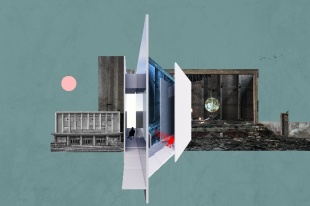Factory manufactures memories for its audience


Buildings, like people, can sometimes hold a special place in our hearts. They are after all, places where memories are made. Even when they fall into a state of disrepair with broken windows, peeling paint and rotten floorboards, they can still ignite warm feelings.
Architect Li Hao had such a feeling for an old factory building that had seen, to put it kindly, better days.
Three years ago, he renovated a theater in a former ceramic factory founded in 1958 in Kunlun town, East China's Shandong province.
The theater, built in 1977, was where the factory held shows and meetings and screened movies. It had fallen into ruin. Sunshine streamed like spotlights through the high glassless windows on the wall.
Li, 34, went to work with his imagination. He went for an arc-shaped interior with mirrors. This gave the impression of a crowd even if only a few people were actually in attendance. It added to the atmosphere.
He then invited former factory employees to visit. When more than 200 surged in, the dam seemed to open as memories and images of the past flooded back in a wave of nostalgia.
Li had even found slides in the rubble that he projected onto the walls.
Since June 6 Li's project has been on exhibition at Beijing's Inside-Out Art Museum. One of the curators, Qian Mengni, says Li's apparent and obvious sincerity is the most moving aspect of the work.
The exhibition titled An Impulse to Turnfocuses on how young artists have dealt with historical material and context.
Li has made the temporary "theater" and the real theater that was set to be dismantled into a double-memory scene, Qian says. The curator is referring to the old memory of factory life and the recent memory of the farewell installation.
A group of Li's relatives and friends, including his parents, grandfather, uncle and aunt, all actually worked at the factory. Li was born in the mid-1980s. That was a time when a large State-owned factory like this could employ thousands of people and was equipped with every facility its employees and their families needed: hospital, canteen, school, hotel and even funeral parlor.
People there knew each other well. When Li was sent by his grandma to buy steamed buns from the canteen at the age of 5, the majority of the time he spent on his way and back was to chitchat with family friends.
In Li's memory, the factory shows were as glamorous as the New Year Galas on TV. His mother used to be the host, and he used to perform as a lead actor with his peers together on the stage.
He had good times; he had bad times, and an embarrassing time. One day during a big family celebration to mark his grandmother's 60th birthday, a classmate ran in to announce the news that Li's homework had just been ranked the worst in class. He was teased about it for days on end.





































